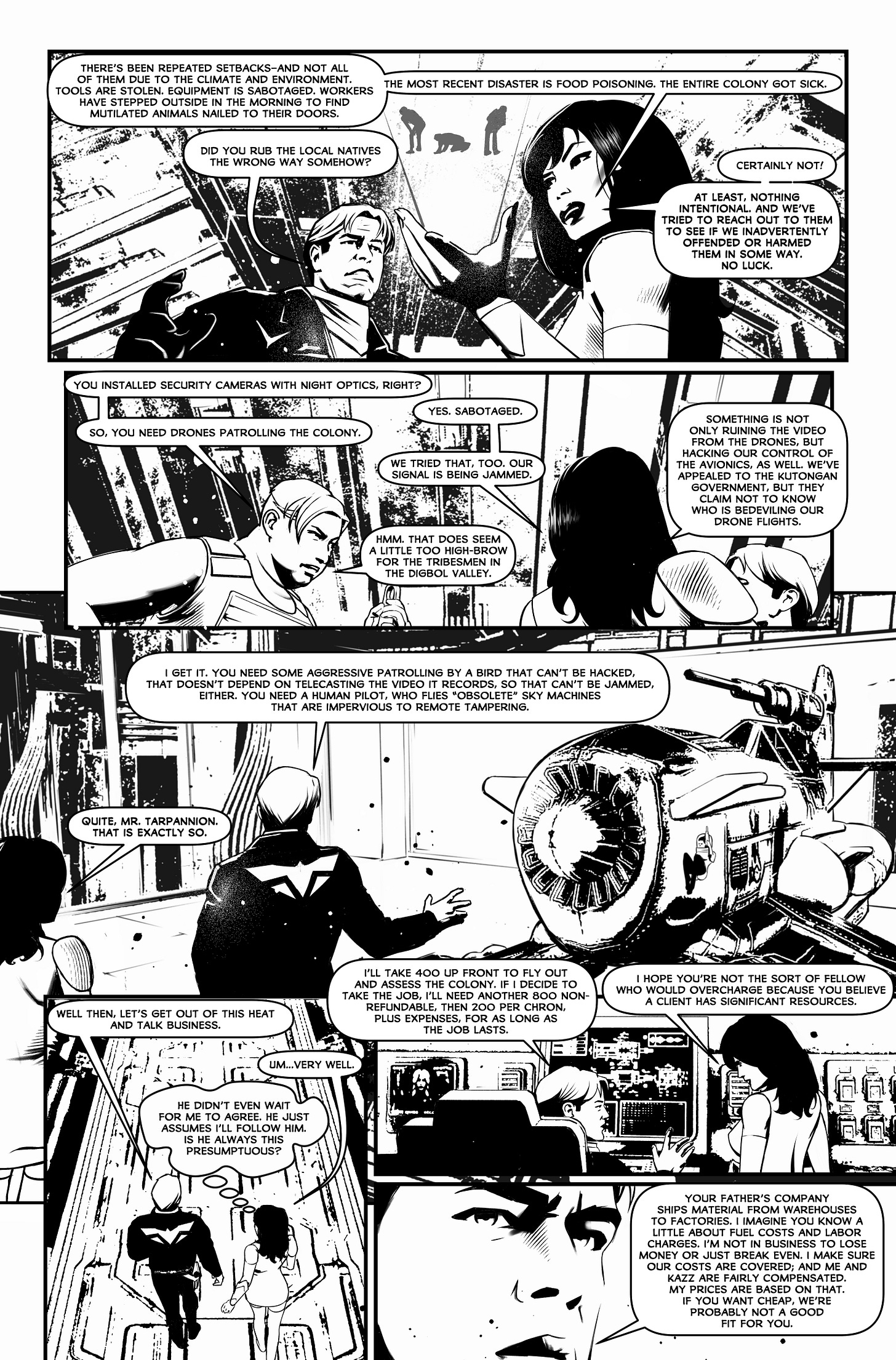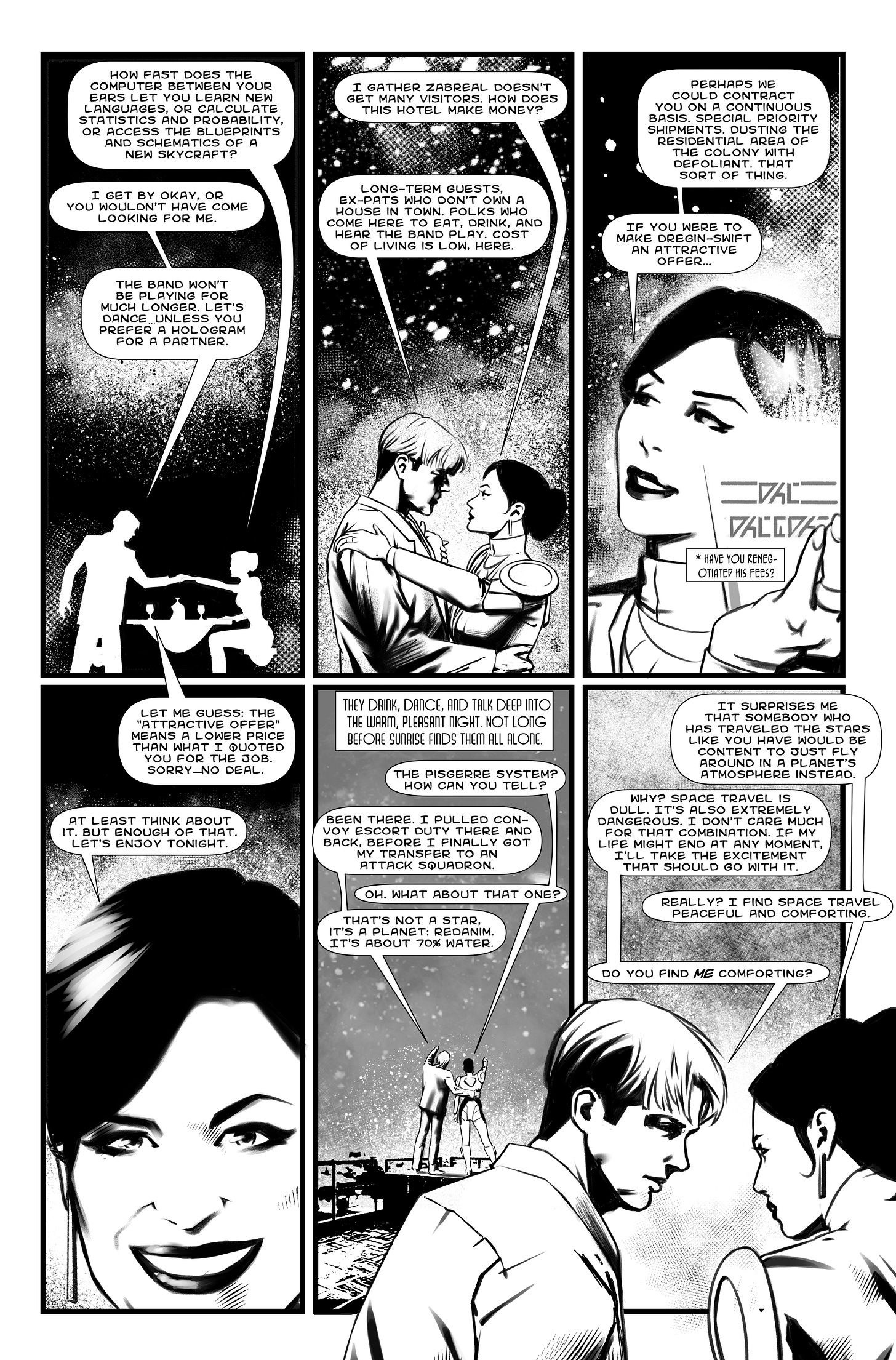The situation could have been better. The original collaboration, for example, wherein I wouldn’t have had to rob Peter to pay Paul Flakemeister Artsharp out of my own pocket. But I was getting pages. The sci-fi graphic novel was off the ground.
Looking back, I wonder how much a couple superficial details played a part in our dynamic: I was completely unknown in the comics biz—tradpub and indie. (Still am unknown—I’ve brought no project to completion, yet.) Not only that, but I had built this sci-fi world from scratch. Neither the artist, nor anybody else, had ever head of it. If I was famous editor Wokey McLuvfaggotz, who had produced such legendary comic hits as Wolverina: the War on Homophobia and The Green Lantern Corps Gay Orgy, he probably would have taken me more seriously. If the story were taking place in a well-established setting/continuity like Gotham, Metropolis, or Asgaard, it’s doubtful he would have resisted instructions so stubbornly, or tried to tinker with characters, locations and props the way he did.
I’ve been underestimated many times. I’ve dealt with a enough people who suffer Dunning-Kruger Syndrome for a dozen lifetimes. So I was especially patient with this artist. I compromised with him on what I could bear to. I threw him some bones as an incentive. I wanted him to enjoy the project.
But honestly: why did I compromise with him on anything? He wasn’t a collaborator. He wasn’t doing this for free. I was paying him for a service. I’ve worked for a lot of different bosses, and I can’t remember a single one who would have tolerated this guy’s stubborn insubordination. I feel awkward using the term “insubordination” to describe what he was doing, because he was a contractor, not an employee. And I didn’t want ours to be a dictatorial relationship. But I can’t think of a better word right now.

We had a pay-as-you-go arrangement. I paid in advance for a page, then, after he turned it in and I approved it, I would pay for the next one and he would totally ignore the script for the first few drafts draw it. It was more than fair for him, making sure I took all the risks, but could at least cut my losses if (when) he flaked on me. Initially, I entered negotiations insisting on the opposite arrangement: he produces a page, and I pay upon approval. How many jobs out in the real world start paying somebody before they’ve done any work? But he was in a tight spot, financially. I had been there myself many times, knew what it was like, and took pity on him.
The artist lived in a dangerous area, apparently, near some “bad people” he wanted to get away from. Toward the end, he begged me for a favor: pay him up front for a few pages, so he could move to somewhere safe.
I knew this could all be a fabricated sob story to take advantage of the gullible “rich” American. But it also could have been true. Why should he continue to suffer when I had the ability to help him? Yeah, this could come back to bite me, but I should still be a good Samaritan when in position to be. God has rescued me many times, only for me to turn around and do wrong immediately after. And yet, He has always been there with second chances. If we try to be more like Jesus, we’ll get stabbed in the back—just like He was. But He never stops loving us anyway—and blessing us, sometimes even in the midst of our sin.
All that to say: I knew the risks, but decided to give him what he asked for.

By this point, the pages were approaching the point in the story that the main characters were established, there had been enough exposition for the reader to understand the basics of this world, and the plot was just about to take off into the second act—into where the adventure really gets going. Also, I got a couple pages in a row from him that were good-to-go. No corrections needed. We were in sync, now. Finally, the fun part was about to begin!
He was able to move out of his dangerous neighborhood. He thanked me profusely. He hadn’t produced anything for a while, because he was busy with moving. Having led too nomadic a life myself, I know very well what an ordeal relocating is, and hadn’t expected him to draw more pages until he got settled.
I got another upbeat email from him. He thanked me some more, then enthused about a new gig offer: Wokey McLuvfaggotz had commissioned him to do the pencilling on a new comic based on a classic character (who had been adapted to the big screen, but hadn’t yet been ruined, so far as I knew). Silly me, I celebrated, too. This was an answer to my prayers for his financial situation and general well-being. I was happy for him.
My assumption was that he could/would work on the mainstream gig most of the time, and probably get more money than what I could pay, but continue producing pages for me, per our agreement, in between the cracks.
Yeah—you probably know that old adage about what happens when we assume.
The delay in getting those pages I paid for increased. He stalled me, saying he needed to do this and that before he could resume. As time drug on, I gradually increased pressure to get those pages from him. When they did finally come, it seemed pretty obvious he was phoning it in. All those lazy shortcuts I didn’t mind so much in moderation were present in a succession of panels. He was just going through the motions, now.
One panel in particular was supposed to introduce another character. He drew her so that her mouth just looked like a black smear. In another panel, we were supposed to see a vehicle that would be seen several times throughout the story. A character was supposed to be opening a hatch on it. There was no vehicle in the panel. Some lines and stuff that may have been the roof of a car on Planet Earth were visible at the bottom of the panel. That’s it.
Here we go again, I thought. Why is he ignoring instructions? I thought we had finally settled that. So I brought to his attention the discrepancy between the art and what the script calls for.
Oh, don’t worry, sez he. It’s all part of his master plan to show the full vehicle in all its glory on page such-and-such, panel so-and-so. But for now, the reader’s being kept in suspense about what the whole thing looks like, blah blah blah.
I could put two-and-two together. There wouldn’t be any page such-and-such, panel so-and-so, because now that he found a big money gig from some established industry professional, he was jumping ship.
To his credit, he did draw the pages I paid him for—though the last page was unusable. Also to his credit, he did finally admit he was jumping ship, rather than just ghosting me with no explanation.
So…there I was. I saw no point in battling him to get revisions. Considering how difficult it was to find an artist even of his integrity, there was no way I could find another one to complete the graphic novel, duplicating his artistic style so it would look like one seamless story. So, what was the point?
All this had done was waste more time and money. Most vehicles I’d ever owned were bought for close to, or less than, what I paid him for these pages I wouldn’t be able to use. It was all for nothing.
Now I was even farther behind schedule, with less money, and more discouraged than ever. Not completely demoralized, but closer to it.
IIRC, this is about the point in time that a friend made a suggestion that I might not have even considered had I not gone through all this drama.
To be continued…




If you pay an artist they should at least follow instructions and stick to your vision